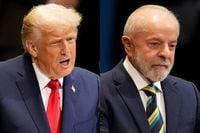Brazil and the United States are once again at the center of diplomatic attention, as both nations navigate a complex web of trade disputes, legal controversies, and regional security concerns. On October 1, 2025, Brazilian Foreign Minister Mauro Vieira took to the floor of the Lower House's Foreign Affairs Committee to clarify his government’s position on a range of hot-button issues, most notably the potential thaw in relations between President Luiz Inácio Lula da Silva and his American counterpart, Donald Trump.
The backdrop to these developments is anything but simple. According to multiple Brazilian officials cited by Bloomberg, Brazil and the US are actively working to arrange an in-person meeting between Lula and Trump. The talks, if they materialize, are likely to take place in a third country, with the upcoming Association of Southeast Asian Nations (ASEAN) summit in October 2025 being eyed as an ideal venue.
But as Foreign Minister Vieira made clear in his testimony, the prospect of dialogue between the two presidents does not signal any softening of Brazil’s stance on the legal fate of Jair Bolsonaro, the controversial former head of state. Bolsonaro, found guilty of masterminding the failed coup d'état of January 8, 2023, has been sentenced to 27 years in jail—a fact that continues to reverberate through both domestic and international politics.
Vieira was unequivocal: "President Luiz Inácio Lula da Silva's openness to trade negotiations with his US counterpart Donald Trump was not to be taken for a prelude to a pardon for the convicted Jair Bolsonaro." He stressed that while Brazil is willing to negotiate the steep 50% tariffs recently imposed by the US, legal proceedings against Bolsonaro are strictly off the table. "Expressly political reasons related to judicial proceedings in the Supreme Court have no place in negotiations between sovereign states," Vieira declared, as reported by Mercopress.
The foreign minister’s comments come amid rising tensions over the US decision to slap political and financial sanctions on members of Brazil's Federal Supreme Court (STF) in retaliation for Bolsonaro’s conviction. Vieira did not mince words, calling these measures "unacceptable interference in internal affairs and unproductive." He insisted that judicial independence is a matter of national sovereignty, not a bargaining chip in international trade or diplomacy.
Behind the scenes, economic data appears to bolster Brazil’s position. As Vieira pointed out, official figures show that the United States has maintained a trade surplus with Brazil for over 15 years. That long-standing surplus, he argued, undermines the economic justification for the new US tariffs. In his words, "the US tariffs have no economic basis," a sentiment echoed by several trade analysts who note that such measures risk escalating into a broader trade conflict that could ripple across both economies.
Despite the charged atmosphere, both sides seem eager—at least publicly—to keep the door open for dialogue. Vieira acknowledged Trump’s willingness to meet with Lula, but he was quick to frame Brazil’s approach as one of "firmness and calm, based on national interests and reliable data." The message was clear: Brazil will engage, but not at the expense of its core principles or judicial independence.
Of course, trade and legal wrangling are only part of the story. Vieira also addressed a growing sense of unease over US military movements in the Caribbean, particularly those aimed at intercepting vessels allegedly carrying drugs from Venezuela. He described the situation as "grave and serious," warning that such actions risk destabilizing the broader region.
"The stability of Latin America and the Caribbean depends on the clear rejection of any form of militarization that could compromise future generations," Vieira asserted. He reiterated Brazil’s longstanding priority to keep Latin America and the Caribbean a zone of peace—free not only from weapons of mass destruction but also from the ethnic or religious conflicts that have plagued other parts of the world.
Drug trafficking, Vieira noted, is already addressed by a host of international agreements. "It should be handled through defined rules, not hostile activity or military invasion," he said, underscoring Brazil’s preference for multilateral cooperation over unilateral military interventions. This stance is consistent with Brazil’s broader diplomatic strategy, which favors dialogue, legal frameworks, and regional consensus-building over confrontation.
All these developments are unfolding against the backdrop of a possible face-to-face meeting between Lula and Trump—a prospect that has both governments buzzing. According to Brazilian officials familiar with the situation, the logistics are still being hammered out, but the ASEAN summit this month is widely seen as the most convenient and neutral setting for such high-level talks.
For President Lula, the stakes are high. He must balance the need to defend Brazil’s economic and judicial interests with the imperative of maintaining constructive relations with the United States, a key trading partner and global power. For Trump, facing his own political headwinds at home, the meeting represents an opportunity to reset US-Brazil relations and perhaps score a diplomatic win on the international stage.
Yet, the shadow of Bolsonaro looms large. Any perception that trade talks could lead to leniency for the convicted former president is politically toxic in Brazil, where the wounds of the 2023 coup attempt are still fresh. As Vieira made clear, "Brazil would negotiate the 50% tariffs but not legal proceedings against Bolsonaro." That line in the sand is unlikely to move, regardless of what happens at the negotiating table.
Meanwhile, the US sanctions against Brazil’s Supreme Court have sparked a fierce debate about the limits of international pressure and the sanctity of domestic legal processes. Many in Brazil see the sanctions as an affront to their sovereignty, while some voices in Washington argue they are a necessary response to what they view as political persecution. The diplomatic fallout from this standoff is still playing out, with both sides keenly aware of the risks of escalation.
As the ASEAN summit approaches, all eyes will be on Lula and Trump. Will they find common ground on trade, security, and regional stability? Or will the unresolved tensions over Bolsonaro and the Supreme Court cast a shadow over the proceedings? One thing is certain: the outcome of these talks will have far-reaching implications, not just for Brazil and the United States, but for the wider Americas as well.
In the end, the drama unfolding between Brasília and Washington is a reminder that diplomacy is rarely straightforward. It’s a high-wire act, balancing principle and pragmatism, national pride and global realities. For now, both countries seem determined to keep talking—however fraught the conversation may be.




